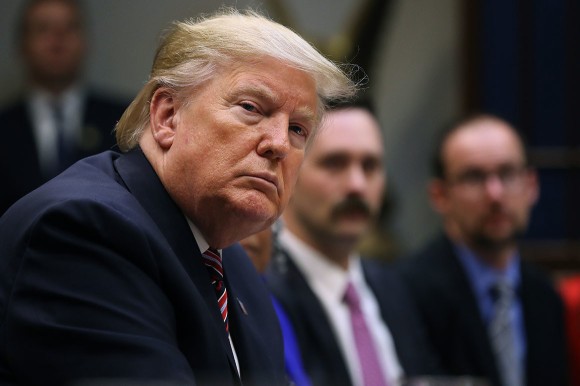American companies paid a record $7.2 billion in import taxes in October, or more than twice the average monthly amount before President Donald Trump began imposing tariffs on Chinese goods and foreign steel and aluminum in 2018.

New figures from the Tariffs Hurt the Heartland campaign also show that Trump’s tariffs have slapped on $42 billion in added costs since they began.
“This trade war has lasted long enough and done enough damage,” said Jonathan Gold, a spokesperson for Americans for Free Trade. “It’s time the administration finalize a deal with China to end the trade war and remove all tariffs.”
When Digre’s father ran the company, it bought components from suppliers in the United States. But that production moved to China and other countries two decades ago, and chances appear slim of the jobs moving back.
“The center of the loudspeaker universe is in China now. So for us to be able to build products and be competitive, we have to buy parts from China,” Digre said. “That’s just the reality. There’s really nobody in the U.S. to buy this stuff from.”
Because of Trump’s tariffs, Misco is paying a 25 percent tax on the Chinese components it needs to make its speaker products. But in an odd twist, finished speakers face only a 15 percent tariff, so Trump has put Misco at a price disadvantage to companies that manufacture in China, Digre said.
In addition to increased tariff costs, Digre also faces unplanned expenses stemming from his search for a new supplier for the speaker components. “It takes a lot of time. You have to find the companies. You have to vet the companies. You have to get samples,” he said last week, before flying off to the Philippines to talk to companies there.
Trump has also imposed duties on steel, aluminum, washing machines and solar products from around the world, using different trade remedy laws. That has provoked trade retaliation from a number of trading partners, including China and the EU, on U.S. agricultural goods and other products.
Americans for Free Trade has teamed up with another group, Farmers for Free Trade, to back the Tariffs Hurt the Heartland campaign. Together, they worked over the past year to highlight the harm the duties are having on American businesses and farmers.
Both groups teamed up with The Trade Partnership, an economic research firm, to compile the latest data based on information published by the Commerce Department.
Duties aren’t just affecting imports but also take toll on U.S. exports, causing further losses for American firms. For the 12 months ending in October, exports of U.S. goods subject to retaliation fell 25 percent below their 2017 levels, said Dan Anthony, vice president of The Trade Partnership. That’s $30 billion in lost sales.
U.S. exports to Canada and Mexico also have not returned to pre-retaliation levels, even though Trump lifted his steel and aluminum tariffs on those countries this summer. That suggests there could be permanent economic losses even when tariff wars are over, Anthony said.
“This data shows that farmers in America’s heartland — the very places where the 2020 campaign will turn — are paying a steep price because of the trade war,” said Brian Kuehl, co-executive director of Farmers for Free Trade. “The president needs to show he can close not just a phase one deal, but a comprehensive deal that rolls back the tariffs and ends the trade war.”
Businesses in Florida, a key presidential swing state, have paid an additional $1.3 billion in taxes because of Trump’s tariffs, the latest data shows.
Companies in other states that could play a key role in Trump’s reelection or ouster are also facing increased tariffs: Michigan, $1.8 billion; Ohio, $1.5 billion; Pennsylvania, $1.2 billion; Wisconsin, $827 million; and Minnesota, $797 million.
Pro-business supporters of the president are acutely feeling the costs. Angela Carr, co-founder of Turbie Twist, a small business based outside Pittsburgh, said the duties are making her reconsider her decision to vote for Trump in 2016.
The company, which sells towels and headbands specializing in quickly drying hair after showers, worked hard to expand since it started in 2006. Its products are now in retail stores like Target, Walmart and CVS, and the company just celebrated 30 million units sold. Any added tariffs on consumer products are not easily passed on to customers.
“We’re not selling Rolexes to millionaires. These are hair towels,” Carr said. “They retail for $9.99, $19.99. Twenty-five percent [tariffs] to us is a huge number.”
Not only have the company’s Chinese suppliers refused to cut their prices in response to the tariffs, they tried to raise them. “We had to negotiate just to keep prices where they are,” Carr said.
“We’re a seven-person show,” Carr said. “We’re just two sisters selling hair towels. For us to pick up and move to Vietnam and qualify a factory, all of that thing, I mean the time and money wouldn’t even be worth it.”
Despite Trump’s anti-China rhetoric during the 2016 campaign, Carr said she assumed he would follow business-friendly policies once in office. But looking ahead to the 2020 election, the costs of his trade policies are making Carr question her allegiance to the Republican Party.
“It would break my heart to have to make a change, but this is my livelihood,” Carr said. “I have to make choices that are best for my family and the families of our team.”